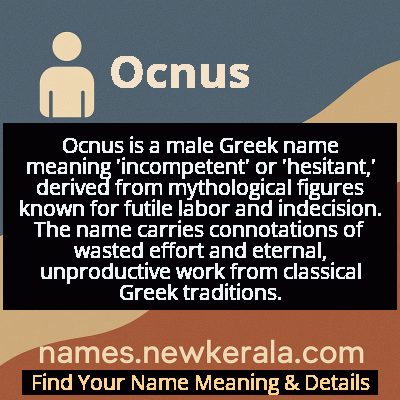Ocnus Name Meaning & Details
Origin, Popularity, Numerology Analysis & Name Meaning of Ocnus
Discover the origin, meaning, and cultural significance of the name OCNUS. Delve into its historical roots and explore the lasting impact it has had on communities and traditions.
Name
Ocnus
Gender
Male
Origin
Greek
Lucky Number
9
Meaning of the Name - Ocnus
Ocnus is a male Greek name meaning 'incompetent' or 'hesitant,' derived from mythological figures known for futile labor and indecision. The name carries connotations of wasted effort and eternal, unproductive work from classical Greek traditions.
Ocnus - Complete Numerology Analysis
Your Numerology Number
Based on Pythagorean Numerology System
Ruling Planet
Mars
Positive Nature
Generous, passionate, energetic, and humanitarian.
Negative Traits
Impulsive, impatient, moody, and can be overly emotional.
Lucky Colours
Red, maroon, scarlet.
Lucky Days
Tuesday.
Lucky Stones
Red coral, garnet.
Harmony Numbers
1, 2, 3, 6.
Best Suited Professions
Military, sports, philanthropy, leadership roles.
What People Like About You
Courage, energy, leadership, generosity.
Famous People Named Ocnus
Ocnus of Etruria
Mythological Founder
Legendary founder of the Etruscan city of Mantua and son of the prophetess Manto
Ocnus Bianor
Mythological Figure
Alternative name for the founder of Mantua, sometimes identified as son of the river god Tiberinus
Ocnus the Rope-Maker
Mythological Character
Proverbial figure known for his endless rope-making that was constantly consumed by a donkey
Name Variations & International Equivalents
Click on blue names to explore their detailed meanings. Gray names with will be available soon.
Cultural & Historical Significance
More famously, Ocnus appears in Greek proverbial literature as 'the rope-maker' - a figure eternally weaving a rope that is immediately consumed by a donkey, symbolizing endless, fruitless labor. This dual significance reflects the Greek appreciation for both heroic achievement and cautionary tales about wasted effort. The name appears in various classical sources including Pausanias and becomes a standard reference in discussions about futile endeavors throughout Western literary tradition, influencing how subsequent cultures conceptualized pointless labor and bureaucratic inefficiency.
Extended Personality Analysis
Individuals named Ocnus are often perceived as hesitant or indecisive, reflecting the mythological figure's association with futility and wasted effort. They may struggle with completing tasks efficiently, sometimes appearing to work hard without achieving meaningful results. This characterization stems from the proverbial rope-maker who labors endlessly while a donkey consumes his work, creating a cycle of effort without accomplishment. The name suggests someone who may have difficulty with follow-through or who gets caught in preparatory stages without reaching completion.
However, this characterization also suggests a persistent nature - someone who continues laboring despite setbacks or lack of apparent progress. The mythological Ocnus's endless rope-making indicates a certain dogged determination, even if misdirected. Modern interpretations might view Ocnus as representing the 'eternal student' or perfectionist who has difficulty moving from preparation to execution, constantly refining without completion. There's also an element of tragic dedication, where the individual remains committed to their task despite understanding its ultimate futility.
Modern Usage & Popularity
The name Ocnus remains extremely rare in modern times, primarily appearing in academic contexts, mythological studies, or among families with strong classical interests. It has never achieved significant popularity in naming databases and is considered an obscure classical reference rather than a practical given name. Contemporary usage is largely confined to literary references, scholarly works, or as a symbolic name in philosophical discussions about labor and futility. The name's strong association with incompetence and wasted effort makes it unlikely to gain mainstream acceptance, though it occasionally appears in fictional contexts or as a distinctive choice for characters in historical fiction. In recent decades, there has been no measurable usage in birth records, confirming its status as a primarily academic or literary name rather than one used for actual naming purposes.
Symbolic & Spiritual Meanings
Symbolically, Ocnus represents the concept of Sisyphean labor - effort that is endless and ultimately fruitless. The rope-making myth serves as a powerful metaphor for tasks that consume time and energy without producing lasting results, similar to filling a leaky vessel or rolling a stone uphill only to have it roll back down. This symbolism extends to modern interpretations of bureaucratic inefficiency, academic procrastination, or any situation where process overwhelms product. The donkey consuming the rope represents the forces that undermine or negate human effort, whether internal (perfectionism, indecision) or external (systemic barriers, changing requirements). However, some philosophical interpretations suggest a more nuanced meaning: Ocnus may represent the value of process over outcome, or the human condition of persistent striving despite knowing the ultimate futility of certain endeavors, making him a symbol of both warning and paradoxical dedication.

